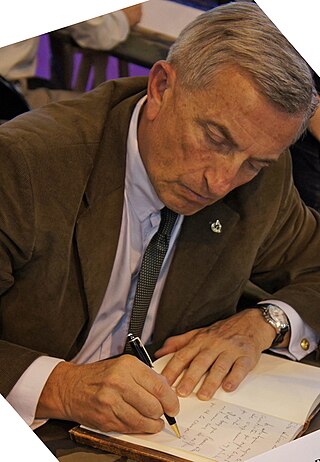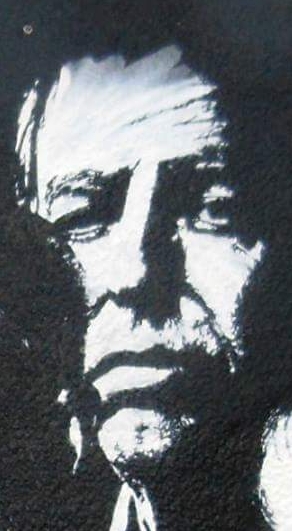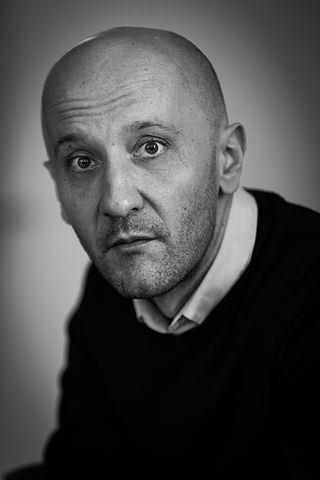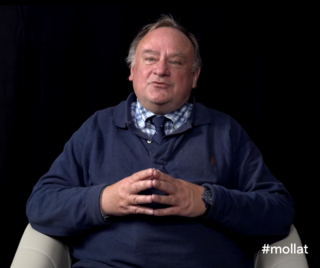
Nicolas Paul Stéphane Sarközy de Nagy-Bocsa is a French politician who served as the president of France and co-prince of Andorra from 2007 to 2012. In 2021, he was found guilty of having tried to bribe a judge in 2014 to obtain information and spending beyond legal campaign funding limits during his 2012 re-election campaign.

Boubacar Boris Diop is a Senegalese novelist, journalist and screenwriter. His best known work, Murambi, le livre des ossements, is the fictional account of a notorious massacre during the Rwandan genocide of 1994. He is also the founder of Sol, an independent newspaper in Senegal, and the author of many books, political works, plays and screenplays. Doomi Golo (2003) is one of the only novels ever written in Wolof; it deals with the life of a Senegalese Wolof family. The book was published by Papyrus Afrique, Dakar.

Michel Serres was a French philosopher, theorist and writer. His works explore themes of science, time and death, and later incorporated prose.
Géraud-Marie de Sède, baron de Liéoux was a French author, writing under the nom-de-plume of Gérard de Sède, and a member of various surrealist organizations. He was born into an aristocratic family from Comminges, the son of Marcel Alfred Gustave de Sède, baron de Liéoux and Aimée de Sède de Liéoux 's first cousins, once removed. De Sède's father was the senior editor of the Catholic newspaper Le Courrier du Pas-de-Calais owned by the De Sède family.
Daniel Cohen was a prominent French economist, a co-founder and professor at the Paris School of Economics, as well as a senior advisor to the bank Lazard.
Jean-Louis Scaringella, is a graduate of the HEC Paris and Harvard Business School. In November 1999 he became the Dean of, and Professor of International Business at, the European School of Management ESCP-EAP.

Vincent Desportes is a retired French Army general and military theorist.
Guy Pedroncini (1924–2006) was a French academic and military historian specialising in the First World War, and notable as the biographer of Philippe Pétain and for his work on the French army mutinies of 1917. He was born in Paris on 17 May 1924 and died on 11 July 2006, at the age of 82.
Paul-Laurent Assoun is a former student of the École normale supérieure de Saint-Cloud.
Martine Abdallah-Pretceille is a French scholar who has contributed to renewing thinking on interculturality since the 1980s. She is Professor Emeritus at the University of Paris VIII and was made Chevalier de la Légion d’Honneur in 2009.

Philippe-Joseph Salazar is a French rhetorician and philosopher,

The obusier de vaisseau was a light piece of naval artillery with a large calibre mounted on French warships of the Age of Sail. Designed to fire explosive shells at a low velocity, they were an answer to the carronade in the close combat and anti-personnel role. However, their intended ammunition proved too dangerous for the crew, and the French navy phased them out at the beginning of the Empire in favour of the carronade.
Bruno Solnik is a professor of finance at Hong Kong University of Science and Technology in Hong Kong. He was academic director of the HKUST-NYU Master in Global Finance. He is also distinguished emeritus professor of finance at HEC Paris.

Bernard Henri Maris, also known as "Oncle Bernard", was a French economist, writer and journalist who was also a shareholder in Charlie Hebdo magazine. He was murdered on 7 January 2015, during the shooting at the headquarters of the magazine in Paris.
Patrick Buisson was a French right-wing essayist, journalist and political advisor. He was a journalist for Minute, Valeurs Actuelles and Le Crapouillot as well as La Chaîne Info. He wrote several books about Vichy France, the Algerian War and the Indochina War. The founder and co-owner of Publifact, a polling agency, he was a key advisor to former President Nicolas Sarkozy from 2006 to 2012, during which time he surreptitiously recorded private conversations he had with the president. He was the co-presenter of Historiquement show, a television program on Histoire, a subsidiary of the TF1 Group, which he chaired.

Olivier Roller is a French photographer based in Paris. He specializes in photographic portraits, and since 2009 he has been creating photographic frescos. The images are about individuals of power, which he places in settings or poses reminiscent of historic portraits, from antiquity to Napoleon, creating portraits of the "emperors of today."

Marie Holzman is a French sinologist, university professor of Chinese, writer, journalist and translator. Her research focuses on contemporary China and Chinese dissidents.

Jean-Marc Daniel is a French Economist, Professor at ESCP Business School and editorial Director of Societal magazine. He describes himself as a classic liberal.
Marguerite-Hélène Mahé was a French writer from Réunion, who is best known for her work Sortilèges créoles: Eudora ou l'île enchantée, published first in 1952, serialised into three issues of Revue des Deux Mondes. It was subsequently reissued whole, twice, in 1955 and 1985. It is a pivotal work in Reunionnais literature, due to its descriptions of the lives of those enslaved on the island. It was also the first novel by a Réunionese writer to use modernism and fantasy. She also wrote an autobiography, which is as yet unpublished.
Philippe Tillous-Borde was a French entrepreneur and engineer. He was a co-founder of the group Sofiprotéol with Jean-Claude Sabin and later president of the Avril Group. From 2007 to 2010, he was a member of the Commission for the Liberation of French Growth.










